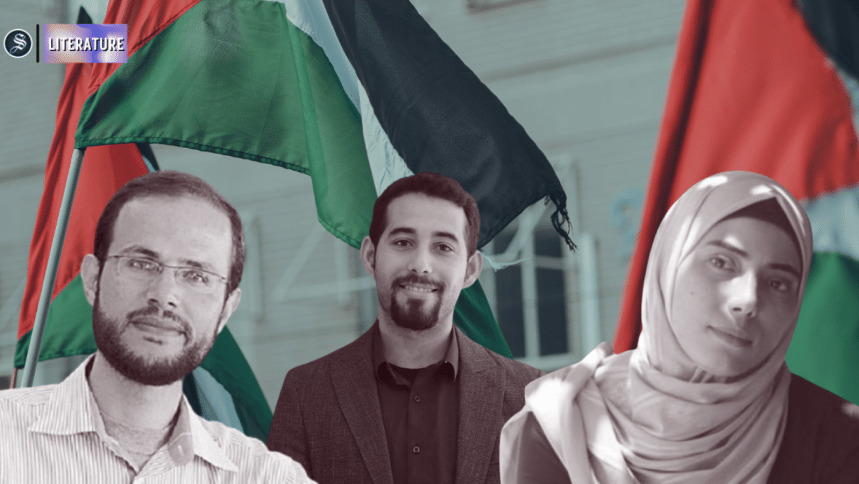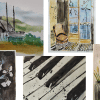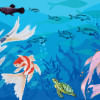Poets from Palestine: Verses written in tears and blood

As we gradually approach a year since Israel started its brutal attack on Gaza, I find myself struggling to articulate, heart heavy with both sorrow and helplessness. This writeup has been sitting in the drafts for quite some time now—words written and rewritten, erased over and over again, because each time I feel as though I'm not doing it justice. A genocide has been unfolding right before our eyes, on our phone screens, each day arriving with yet another horrific attack on the people of Palestine. But amidst the bloodshed and carnage, there is resistance—taking various shapes and forms, one of which is poetry.
As Ghassan Kanafani stated, "The cultural form of resistance is no less valuable than armed resistance itself." For Palestinians, poetry has historically been a beloved form of art. Notable poets like Mahmoud Darwish, Fadwa Tuqan, Tawfiq Zayyad, Salem Jubran, Sameeh Al Qaseem, among others, have resisted the occupation through poetry and called for liberation.
The beauty of poetry lies in its storytelling, how its words can be woven together to tell tales of life, tradition, love, and culture; how it can express both joy and sorrow, calls for justice and emancipation. For Palestinians, especially Gazans—poetry is born under raining bombs, in mourning, in isolation and betrayal, in celebration of life and hope.
Sitting from the comforts of our home, while it is unfathomable for us to fully comprehend what they're experiencing—poets from Palestine allow us a glimpse of their lives through their penmanship. Influenced by predecessors such as Mahmoud Darwish or Ghassan Kanafani, these poets write about the Palestinian plight, something that is not limited to Gaza or West Bank, but rather shared by Palestinians across the globe.
The poems by Palestinians present the stark realities of the Palestinian existence, both the anguish and the joy, the suffering from living under occupation, and the inevitability of death looming over them. They don't have the needless sensationalism, nor do they have the passive voice of the mainstream media.
Gaza Poets Society (@PoetsGaza on X, @gazapoets on Instagram), a literary community of young poets and artists in Gaza, has regularly been posting on its social media pages on Facebook, Instagram, and X (formerly Twitter).
In a heartbreaking poem, titled, "Please forget about us", its founder Mohammed Moussa writes,
"Please forget about us,
Forget our names, our freedom to exist,
The bloodstains on your screens,
The screams under your pillows,
The echo of our hunger
Our bodies buried in rubble…
…simply forget us, for we too have lost memory of your existence."
The poem expresses the deep isolation felt by thousands of Palestinians in Gaza as they tirelessly go on recording the slaughter of their own people to counter the narrative of the global media, and with the hopes of any kind of international intervention. Despite mass protests across the globe in support of the Palestinian liberation, the bombing has yet to cease. Presidential election debates don't reserve a seat for their sufferings. The world moves on. And so, the betrayal and abandonment is palpable in Moussa's poetry.
It has been 76 years since the occupation and the Nakba, and 365 days since the bombing began. But even as Gaza is being destroyed right at this very moment, with a death toll that keeps rising (over 42,612 according to Gaza's Ministry of Health), to the point where it is near impossible to count the dead properly as there are thousands stuck under the rubble…the world has not stopped. From sports tournaments to religious celebrations, nothing really halted for the rest of the world. Even though Jesus Christ's birthplace in Bethlehem, Palestine itself was also bombed during Christmas last year, it never stopped celebrations elsewhere. No eid celebration was halted. While protests for Palestine have never been more widespread, there are many who have become used to seeing the genocide unfold on screen, many had learned to look away. Not to mention how despite the protests, global boycotts and other collective steps taken by Pro Palestine allies around the world, nothing has stopped Israel's attack on Gaza and West Bank. The Western empire continues to be complicit in this genocide as Israel is now invading other countries like Lebanon.
Yet the world goes on. Which is why, Samer Abu Hawwash, in "It No Longer Matters If Anyone Loves Us" (translated by Huda Fakhreddine) writes,
"It no longer matters
if anyone loves us.
We are tired of words, the said and the unsaid,
tired of hands that reach out but do not touch,
of eyes that see but do not see."
But amidst sorrow and heartbreak, there is resilience. For Palestinians, with their history of colonial struggles and oppression under the occupation, resilience is deeply embedded in their identity. The word Sumud (Arabic:صمود), meaning "steadfast perseverance" is a Palestinian cultural value, deeply intertwined with each person's identity. It is said that the way to live Sumud is by preserving one's connection to their culture, land, and history. Enacting Sumud through poetry allows them to preserve their stories tied to the land, to celebrate everyday life, to recall one's history and customs, to find joy despite the suffering, to retrace their roots, and to empower one to be steadfast in the face of despair. Against oppression, to love and find joy is an act of resistance itself. Through his rich poetry, Mahmoud Darwish, the national poet of Palestine, emphasised on maintaining connection with the homeland for as long as he lived. To be Palestinian is to live by Sumud.
Another Gazan poet, Shahed Alnami, writes in "Life Lessons", "…We move through the debris of our homes and fragments of our broken dreams, yet we stand tall…"
The poets write about the tragedy of displacement, how one loses both a home and memories, belongings of deceased loved ones.
So, in the poem, "Leaving Childhood Behind" from Things You May Find Hidden in My Ear, Mosab Abu Toha writes,
"When I left, I left my childhood in the drawer
and on the kitchen table. I left my toy horse
in its plastic bag.
I left without looking at the clock.
I forget whether it was noon or evening."
The founder of the Edward Said Library, Gaza's first English language library, Mosab Abu Toha, a poet and writer himself, was detained by the Israeli Occupation Forces in November 2023 while he was escaping to Egypt with his family. He was later released after going through torture and has been working as a chronicler of the war from a distance.
Poems from Palestine not only tell the stories of their resilience, but also their sense of duty in the face of carnage and the acceptance of imminent death. Ever since the beginning of the attacks in Gaza, Palestinians have been working tirelessly in order to help their people. Journalists risk their lives to let the world know what is happening there. Healthcare workers work day and night to provide medical care to the injured and the ill, with little to no equipment. Rescuers use their bare hands to drag both the living and the dead from under the rubble. Regular civilians, each trying their utmost, demonstrate their resilience and resourcefulness in helping their fellow Palestinians, whether it's by building makeshift ovens in refugee camps, cooking meals, or more. Each of them lives by Sumud and a profound love for their land and people. Even when it comes to death, they face it together.
And so, Mohammed El Kurd (@mohammedelkurd on Instagram), in his poem, "Tonight we die as a family", writes the story of a nurse who is startled by a visitor on the stretcher: the corpse of her deceased husband.
"There are not enough ambulances in Gaza and more than enough death.
She is livid. Men never listen.
I told you wait till after my shift
I need to tend to the wounded first
I told you tonight we die as a family."
Feminist poet and award winning author, Hiba Abu Nada, was killed in an airstrike back on October 20, 2023. Not long before her death, she had written "I grant you refuge":
"I grant you refuge
I grant you refuge in knowing
that the dust will clear,
and they who fell in love and died together
will one day laugh."
Earlier this year, Publishers for Palestine published a chapbook, titled, Poems for Palestine: Recent poems by nine Palestinian poets & actions you can take to stop genocide now. The chapbook included poems by Refaat Al-Areer, Fady Joudah, Hiba Abu Nada Olivia Elias, Samer Abu Hawwash, Maya Murry, Ahlam Bsharat, Basman Aldirawi, and Ghassan Zaqtan. The poems in this brief collection were written between mid-October 2023 and December 2023.
According to an article by Euro-Med Human Rights Monitor published on January 20, 2024, the Israeli Army has deliberately targeted academic, scientific, and intellectual figures in specific air raids on their homes without prior notice. Both Refaat Al-Areer and Hiba Abu Nada were among them.
Just days before being assassinated in a surgical strike, activist and professor Refaat Al Areer wrote "If I must die". Almost like a self-written eulogy, in the poem, the poet urges the reader to tell his story, to make and fly a white kite after his passing, so that a child in Gaza can see it and find hope.
After his death on December 6, 2023, protesters had carried white kites in his honour; his poems were recited in marches, in encampments, and in university campuses. The poem has been translated in almost 40 languages.
While the forces of imperialism and occupation have never been more devastating, the support for resistance and the emancipation of Palestine has never been louder, a stark contrast to the government support for the apartheid and Israeli Occupation of Palestine. Resistance takes many shapes and forms, from taking up arms, to facing police batons, to picking up a pen. From cartoons to songs, paintings, and poetry—throughout history, art has been a powerful tool to fight against oppressive systems and ideologies. And so, despite the verses being penned with tears and blood, the resistance of the Palestinian poets continues.
As Refaat Al Areer said,
"If I must die
let it bring hope
let it be a tale."
Tiasha Idrak is drowning in a swamp of her own thoughts. She writes and daydreams, though she does the latter most of the time.

 For all latest news, follow The Daily Star's Google News channel.
For all latest news, follow The Daily Star's Google News channel. 








Comments